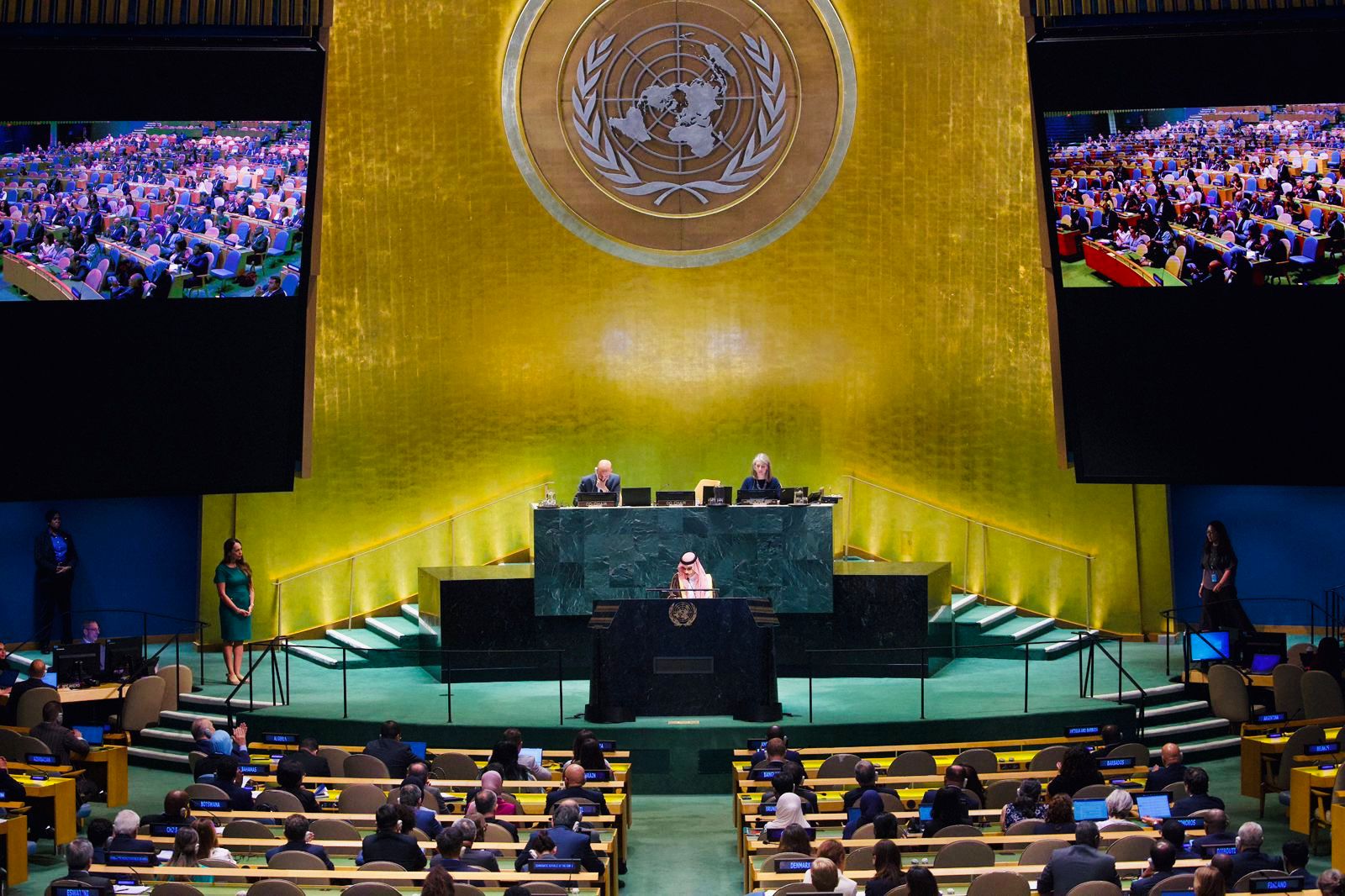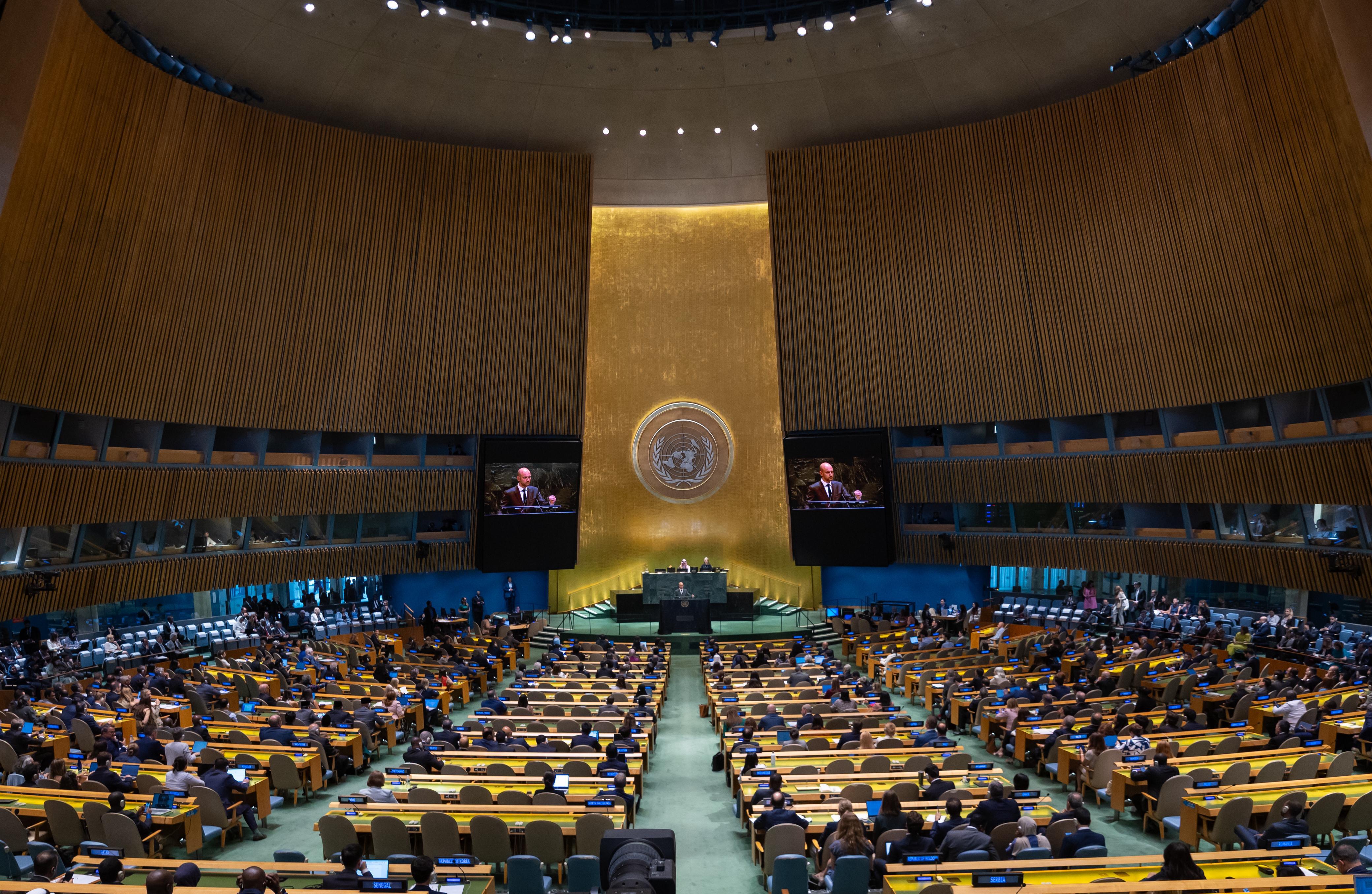His Excellency Mr Jasem Mohamed Albudaiwi, Secretary General of the Gulf Cooperation Council (GCC), stated that regional stability begins with the establishment of the State of Palestine's identity on the world's legal and diplomatic map. He called on all countries to join the Global Alliance for the Implementation of the Two-State Solution and to recognise the State of Palestine as a prelude to rebuilding trust and establishing a genuine peace.
This statement was made during His Excellency's speech at the high-level ministerial session of the United Nations (UN) Conference for the Peaceful Settlement of the Question of Palestine and the Implementation of the Two-State Solution, held today, Monday, July 28, 2025, at the UN Headquarters in New York City.
The conference was co-chaired by the Kingdom of Saudi Arabia and the Republic of France, with high-level participation from regional and international states, organisations, bodies, and institutions.
At the beginning of his speech, His Excellency expressed his deep appreciation to the Custodian of the Two Holy Mosques, King Salman bin Abdulaziz Al Saud, and His Royal Highness Prince Mohammed bin Salman bin Abdulaziz Al Saud for the Kingdom of Saudi Arabia's initiative to establish the Global Alliance for the Implementation of the Two-State Solution, affirming that this step represents a strategic vision that redirects the international compass towards the core of the Palestinian-Israeli conflict.
Moreover, His Excellency praised the French role in co-chairing the conference with the Kingdom, and the efforts exerted by His Excellency President Emmanuel Macron and His Excellency Mr António Guterres, Secretary General of the UN, in defense of the legitimate rights of the Palestinian people.
Furthermore, His Excellency affirmed that the Palestinian issue has not been absent from the conscience of the Cooperation Council since its establishment in 1981. "This issue will remain at the forefront of the Council's priorities as a non-negotiable matter of right and justice," His Excellency stressed, calling on the countries that have not yet recognised the State of Palestine to take this sovereign step, which represents a political and moral necessity for launching genuine peace negotiations.
Additionally, His Excellency underscored the Council's keenness to keep this issue present in the conscience of the international community and to continuously counter any attempts to marginalise or bypass it.
"The year 2002 was a landmark, when the Council announced its full support for the Arab Peace Initiative, presented by the Kingdom of Saudi Arabia, as an integrated strategic vision for achieving a just and lasting peace. This initiative laid a solid foundation for the equation of a possible peace by explicitly calling for the establishment of an independent Palestinian state on the borders of June 4, 1967, with East Jerusalem as its capital, as a fundamental condition for any realistic settlement that restores balance and stability to the region," His Excellency pointed out.
During his speech, His Excellency commended the countries that have elevated their positions to the level of historical responsibility and made the sovereign decision to recognise the State of Palestine. He described this as a clear expression of their commitment to international justice, a reflection of the political awareness that peace cannot be built on denial, and that regional stability begins with establishing the Palestinian state's identity on the world's legal and diplomatic map.
Besides, His Excellency Mr Albudaiwi extended a sincere invitation to those countries that have not yet taken the step of recognising the State of Palestine, stating that the continued denial of international recognition to one of the parties to the conflict perpetuates a fundamental imbalance in the structure of the political process and empties peace negotiations of their substance.
"The explicit recognition of the State of Palestine is a political and moral necessity that establishes an equal negotiating process and prepares a solid ground for launching a genuine and lasting peace," His Excellency stated, calling on these countries to join this alliance through the responsible step of officially recognising the Palestinian state, as a prelude to rebuilding trust and establishing a genuine peace.
His Excellency reiterated the firm positions of the Cooperation Council, foremost among them the support for the establishment of an independent Palestinian state on the borders of June 4, 1967, with East Jerusalem as its capital, the condemnation of the Israeli aggression on the Gaza Strip, and the rejection of settlement policies that undermine the two-state solution.
This is in addition to emphasising the role of UNRWA and the importance of continuing to support humanitarian aid and reconstruction, and condemning all forms of aggression against innocent people around the world, regardless of their religion, race, or gender, based on a firm belief that justice is an indivisible whole.
His Excellency also condemned the Israeli attacks that have affected the territories of the Islamic Republic of Iran, the Lebanese Republic, and the Syrian Arab Republic, warning of the danger of the continuation of these violations to international peace and security and the freedom of international navigation. He described them as a flagrant violation of international law and the Charter of the UN, which is based on respect for sovereignty and the resolution of disputes by peaceful means.
"The Israeli Knesset's approval of a draft resolution to impose Israeli occupation sovereignty over the West Bank and the Palestinian Jordan Valley in the occupied territories is a blatant challenge to international law and relevant international legitimacy resolutions. It is a dangerous escalating step that would undermine security, stability, and peace opportunities in the region," His Excellency concluded, renewing the call for the international community to assume its legal and moral responsibilities towards these violations.

